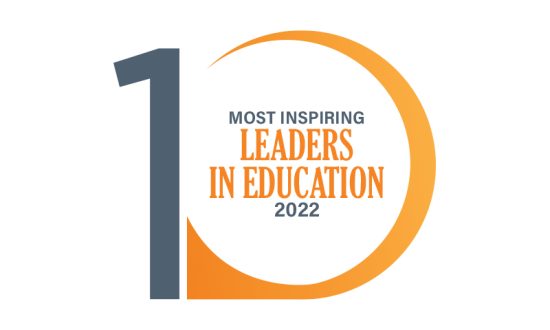The past two years have been extremely challenging for the global education system. During this time, we spoke to the administrators and academicians of prestigious educational institutions across India. These inspirational leaders come from different backgrounds and have unique leadership styles. Each of them has an interesting story to tell. But all of them are driven by a similar goal: to offer quality education to their students and make them future-ready. To know more about their journeys, check out Higher Education Digest’s latest issue of ‘10 Most Inspiring Leaders in Education -2022’. Below are the excerpts from the stories we have covered in detail. You can read them in the coming pages.
Dr. Amita Dev (Vice-Chancellor, Indira Gandhi Delhi Technical University for Women): “I feel that a holistic approach is needed in the current education system where students are given the freedom to choose their own courses, earn credits, and set duration for their course completion. Additionally, multi-point entry & multi-point exit options along with academic bank of credits are needed. These would prove extremely beneficial for the overall growth and progress of students.”
Dr. Anant M. Chakradeo (Pro-Vice-Chancellor, MIT Art Design and Technology University): Last 2 years, we witnessed our hybrid-mode batches graduating and successfully completing their Bachelor’s / Master’s Degrees/ PG Programs. They are now part of national and global brands, pursuing flourishing careers. The most important part was that we could save their valuable academic years without diluting the quality of programs.
Dr. C. Krithika (Registrar, Meenakshi Academy of Higher Education and Research (MAHER)): “Overall, I would like to see a good balance between teaching and research activities, as one cannot exist without the other. There is also an urgent need to inculcate values like professional ethics, gender sensitization, conflict resolution, environment consciousness etc among our students; so such courses can be offered as non-credit compulsory courses across all professional programs.”
Dr. Indranil Sen Gupta (Vice-Chancellor, JIS University): “We often pretend that the two are always working together, but the truth is often otherwise. Our curricula must be designed in such a way that the students who graduate become more acceptable by the industry. Also, the industry must understand that in an academic system we can teach general concepts and skills to the students, and not the specific things required by them. More industry-oriented internship programs and projects can help in bridging this gap.”
Dr. KTV Reddy (Dean, Faculty of Engineering and Technology (FEAT), Datta Meghe Institute of Medical Sciences): “The teaching learning process should become product, team and expert-based. Awarding degree must have minimum standard at all levels. Implementation of NEP 2020 will help the education system to apply talent-based, multi-disciplinary approach. Supervisors or experts based physical learning is always desirable over digital mode.”
Dr. Parsanjeet Kumar (Pro Vice-Chancellor, Noida International University): “If we can build teachers’ capacities to construct and adapt curricula to the identified needs and interests of students then we can also grant them greater autonomy for making the sort of differentiated decisions that can individualize and personalize learning. Give teachers the opportunity to make decisions that empower teachers and strengthen their relationships with students.”
Prof. (Dr.) P.P. Mathur (Vice-Chancellor, Birla Global University): “The current education system needs to be reformed in a very innovative way and I feel that the NEP 2020 has given enough insight in that direction. However, there are many difficulties and conflicts. If we are able to implement even the academic guidelines, our education system will become far better compliant and learner centric than it is now.”
Dr. R. Balaji (Secretary and Correspondent, SBIOA Educational Trust): “Value education should be made compulsory. Students must be taught in depth about the morals of life, inculcated with humanistic values. Education should be above mediocre level that we have engrained in the precise education from holistic approach. Counseling should be given more importance. Technology like AI can become a helping hand to the teachers as well as students.”
Raunak Jain (Managing Director, Tula’s International School): “One thing I would like to bring in the education system is empower our teachers. If we can build teachers’ capacities to formulate and adjust the curriculum to the stipulated requirements and curiousness of scholars then we can also give them more significant freedom for creating the type of eminent judgments that can individualize and personalize learning. We need to furnish teachers with the opportunity to make decisions that improve and reinforce their relationships with the students.”
Prof. Suman Chatterjee (Registrar, Sister Nivedita University): “We need to become more student-oriented. The only thing that is constant is change, so let us embrace new technology, methods of teaching-learning process along with our ancient values and teachings. New courses, new placements avenues, and unique approaches towards student management are required. Every student is important irrespective of their intelligence. We should hand-hold each one of them.”
Our inspirational team of leaders in education hold vast years or experience in academia and administration. Their thoughts and insights are a proof of that. If policy makers can implement (few, some, all) changes suggested by our leaders, then our education system will become more progressive.




